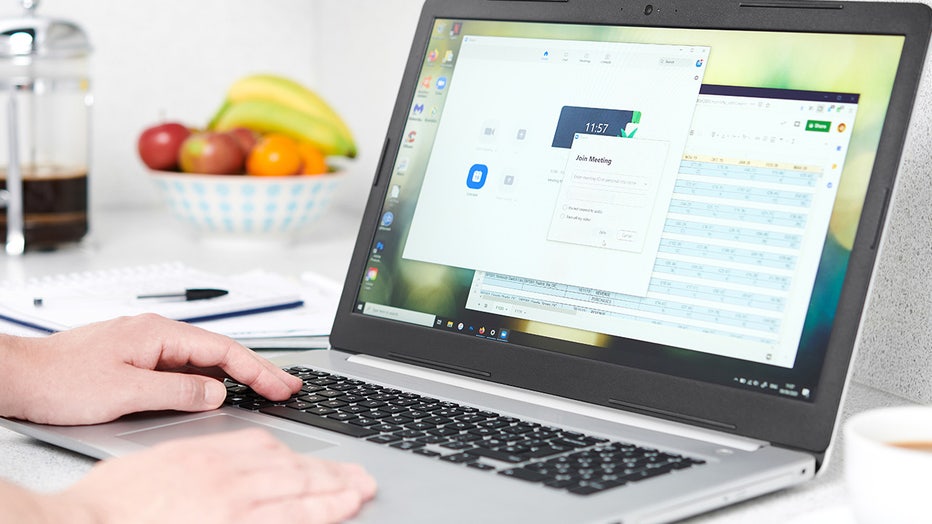Remote work may ‘improve resiliency of employees,’ study finds
COLLEGE STATION, Texas - Amid the ongoing COVID-19 pandemic, new research suggests that remote work may not negatively affect productivity.
A research team from Texas A&M University’s School of Public Health found the ability to work remotely may improve the resiliency of employees to perform workplace tasks during events causing workplace displacement.
In the study, published in IOS Press, the team worked with a large Fortune 500 corporation in Houston to analyze ergonomic software data and computer usage from 264 randomly-selected work-from-home employees between Jan. 2017 and Dec. 2018.
During the analysis, the company was forced to close its offices due to flooding from Hurricane Harvey, a Category 4 storm in 2017 that required employees to work remotely.

Detail of a home office setup, including a laptop computer with Zoom video conferencing software, taken on September 9, 2020. (Credit: Phil Barker/Future Publishing via Getty Images)
"We conducted an interrupted time series analysis to investigate the impact of Hurricane Harvey on employee computer use during and after a seven-month displacement period from the physical workplace," the study authors wrote of their objective.
The team analyzed five daily metrics of employee computer usage: total number of hours worked per employee, total active work time, keyboard use per active minute, mouse usage per active minute, words typed per hour and the number of typographical errors per word typed.
While researchers found there was no change in total computer use in response to the hurricane, active computer use significantly declined for a transient period.
However, throughout the remainder of the period when employees were completely displaced from the physical workplace, an increase in the total number of time and hours worked was observed. All measured computer use behaviors returned to baseline prior to the complete return to the physical workspace.
RELATED: Some employees believe remote work hindered career growth, study finds
"Despite a transient period of reduced activity during closure of the workplace building, productivity returned to normal prior to the employees’ return to a commercial workspace," the authors continued. "The ability to work remotely may improve resiliency of employees to perform workplace tasks during events causing workplace displacement."
Overall, the findings suggest that although there may be an immediate impact of displacement during natural disasters and other events, given the availability of alternative working conditions, productivity may return to baseline levels relatively quickly.
And, this news comes as more workers become increasingly interested in working remotely as a result of the COVID-19 pandemic.
"In the future, there will be a greater percentage of the workforce who is involved in some sort of office-style technology work activities," researcher Mark Benden, who is director of the school’s Ergonomics Center, told Texas A&M Today. "Almost all of the study’s employees were right back up to the same level of output as they were doing before Hurricane Harvey. This is a huge message right now for employers because we’re having national debates about whether or not employees should be able to work remotely or in a hybrid schedule."
The researchers believe this information can be used in the future to promote healthy behaviors for employees and inform corporate policies.
"This study provides supportive evidence for incorporating remote working policies in a company’s organizational strategy prior to a natural disaster or other disrupting event. These findings are particularly informative given current social distancing policies and dramatic increases in the demand for remote work in 2020/21," the authors added.
The team will also be looking at tracking the ergonomic environment in employees’ home offices. The team believes that tracking this type of data can help companies address remote employee health issues, including stress, depression and substance abuse.
"The question was whether we could track people and rather than letting them stay in a bad place, a bad habit or bad behavior, could we give them a healthful nudge over the computer to remind them that it was time to take a walk or a break," Benden continued, adding, "We as humans are not very good at keeping track of time, especially when we’re in the zone. In order to keep us from physically hurting our bodies, we need to have nudges and reminders, which people respond to, and which work really well."
Benden also noted that taking breaks did not hinder the employees’ quality of work.
"The people who took the recommended breaks were more productive overall. They got more done," he said. "We need to learn this about people, we need to teach people about it, and then we need to help people actually do."
This story was reported from Los Angeles.

